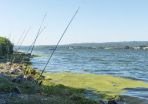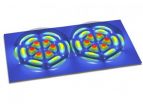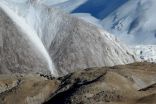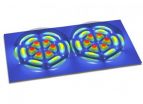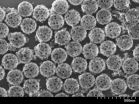(Press-News.org) This news release is available in German.
Substantial improvements in freshwater quality by 2015 have been a declared objective of the EU member states, manifesting itself by the requirements of the Water Framework Directive (WFD). A recent study conducted by the Institute for Environmental Sciences Landau together with the Helmholtz Centre for Environmental Research (UFZ) and fellow scientists from France (University of Lorraine and EDF) and Switzerland (Swiss Federal Institute of Aquatic Science and Technology - EAWAG) shows that this target is unlikely to be met due to the high levels of toxicants in the water bodies. One of the reasons: current measures for the improvement of water quality do not account for the effects of toxic chemicals. The study demonstrates for the first time on a pan-European scale that the ecological risks posed by toxic chemicals are considerably greater than has generally been assumed.
Up to now environmental authorities and parts of the scientific community have considered toxic chemicals to be rather a local problem affecting only a few bodies of water. The current study, however, reveals for the first time on a large scale the ecological risks emanating from chemical toxicants for several thousands of European aquatic systems. Chemical toxicity represents an ecological threat to almost half of all European bodies of water, and in approximately 15% of cases, the biota in freshwater systems may even be subject to acute mortality.
Actual state of European aquatic ecosystems is presumably even worse
Together with their French and Swiss fellow researchers the scientists from Landau and Leipzig have investigated the exceedance of risk thresholds in the river basin of major stream networks, such as the Danube and the Rhine River at a pan-European level. For the first time, the extent to which risk thresholds were exceeded for three groups of organisms, namely fish, invertebrates and algae / primary producers, was estimated for these major river basins. The data used originated from official water monitoring activities of recent years. The scope of sampling consequently varied significantly in terms of spatial coverage, as well as timing, therefore, direct comparison(s) between different countries proves rather difficult. For example, the study finds, that water quality is worst in France, presumably due to the fact that authorities in this country installed a dense monitoring network and analyzed water samples for a multitude of substances, including the ecotoxicological relevant compounds. In other countries, by contrast, risks may remain unrecognized due to inadequate sensitivity in chemical analysis or an incomplete list of ecotoxicologically relevant monitoring compounds. "Generally speaking we probably underestimated rather than overestimated the risks in our analyses", comments the head of the research study team, Jun.-Prof. Dr. Ralf B. Schäfer from the Institute for Environmental Sciences Landau. "The actual state and condition of European freshwater ecosystems is probably even worse."
The primary factors contributing to chemical contamination of aquatic ecosystems are the discharge from agricultural activities, urban areas and municipal sewage treatment plants. Pesticides were by far the major toxicants of freshwater systems, although, organotin compounds, brominated flame retardants and combustion-derived polycyclic aromatic hydrocarbons, also occurred at critical levels of concentration. EU requirements and targets regarding water quality currently focus primarily on the occurrence of the so-called priority substance, i.e. around 40 chemicals classified as being particularly hazardous to the aquatic environment. "Fortunately the use of many of these priority substances is no longer permitted and therefore, their concentration levels are steadily decreasing in many parts of the European streams. The real problem, however, is that a large number of chemicals which are currently in use are not taken into account at all in the context of water quality monitoring", states Dr. Werner Brack from the Helmholtz Centre for Environmental Research in Leipzig. Additionally, recent findings show that for certain substances the assumed level(s) of effect concentration might be too high.
Improved definition of framework objectives and coordination are essential
In order to cope with the multitude of potentially hazardous substances , the scientists participating in this study recommend the introduction and intelligent linking of ecological and effects-based chemical screening methods as the only financially viable way of capturing the whole spectrum of ecotoxicologically relevant substances. "In this way", Werner Brack points out, "hazardous substances can be detected even before they have been placed on the priority list". The current study, shows that there is an urgent need for action, especially with respect to the current chemical monitoring activities. "In practical terms, this means that urgent action is required at all levels, to ensure the sustainable protection of our aquatic ecosystems", says Schäfer. The necessary steps to be taken range from general prevention of excessive chemical inputs into water bodies and the banishment and substitution of particularly problematic substances, up to a reduction in the application of agricultural chemicals and an improvement of sewage and wastewater treatment methods and technology. There is consensus among the members of the research team that, unless there is noticeable change to the current situation, the objectives and targets of the Water Framework Directive will not be met, due to toxicity from chemicals in the freshwater ecosystems. In the long term this may also lead to risks for humans, caused by possible failure of ecosystem services, such as impairment of the self-purification capacity of water bodies.
INFORMATION:
Publication:
Egina Malaj, Peter C. von der Ohe, Matthias Grote, Ralph Kühne, Cédric P. Mondy, Philippe Usseglio-Polatera, Werner Brack, and Ralf B. Schäfer (2014): Organic chemicals jeopardize the health of freshwater ecosystems on the continental scale PNAS 2014 ; published ahead of print June 16, 2014, doi:10.1073/pnas.1321082111
http://www.pnas.org/cgi/doi/10.1073/pnas.1321082111
This study was funded by Electricité de France (EDF), the French National Research Agency (ANR) and the Deutsche Forschungsgemeinschaft (DFG).
Participating institutions:
Institute for Environmental Sciences Landau at the University of Koblenz-Landau, Helmholtz Centre for Environmental Research (UFZ), Electricité de France (EDF) and the University of Lorraine in France and the Swiss Federal Institute of Aquatic Science and Technology (EAWAG) in Switzerland.
Further information:
University of Koblenz-Landau
Institute for Environmental Sciences Landau
Jun.-Prof. Dr. Ralf B. Schäfer
Telephone: +49 6341 280-31536, e-mail: schaefer-ralf@uni-landau.de
Helmholtz Centre for Environmental Research (UFZ)
Department of Effect-Directed Analysis
Dr. Werner Brack
Telephone: +49 341 235-1531, http://www.ufz.de/index.php?de=17477
Press contacts:
University of Koblenz-Landau
Kerstin Theilmann (University Press Office)
Telephone: +49 6341 280-32219
E-mail: theil@uni-koblenz-landau.de
or:
Helmholtz Centre for Environmental Research
Tilo Arnhold, Susanne Hufe (UFZ Press Office)
Telephone: +49 341 235-1635, -1635
http://www.ufz.de/index.php?de=640
Links:
Controlling Chemicals' Fate:
http://www.ufz.de/index.php?en=32298
EU Project SOLUTIONS:
http://www.solutions-project.eu/
Chemical pollution of European waters is stronger than anticipated
Large-scale study shows: Ecological targets of the Water Framework Directive will presumably not be met
2014-06-17
ELSE PRESS RELEASES FROM THIS DATE:
Social inequality intensifies amongst low-scoring pupils
2014-06-17
Children's marks at school influence the likelihood of them abandoning their studies, but the effect varies according to their social background: among students with poor marks, those from a higher social class have more opportunities to raise their marks than children of low-skilled workers. This is according to a study carried out by researchers from the National University of Distance Learning (UNED) and the European University Institute.
"The study deals with dissociating the effect of the marks (considered the 'primary source' of educational results) from other processes ...
Strange physics turns off laser
2014-06-17
Inspired by anomalies that arise in certain mathematical equations, researchers have demonstrated a laser system that paradoxically turns off when more power is added rather than becoming continuously brighter.
The finding by a team of researchers at Vienna University of Technology and Princeton University, could lead to new ways to manipulate the interaction of electronics and light, an important tool in modern communications networks and high-speed information processing.
The researchers published their results June 13 in the journal Nature Communications (Ref. 1).
Their ...
Study: In wild yak society, moms are the real climbers
2014-06-17
NEW YORK (June 17, 2014) – A new study led by the Wildlife Conservation Society says that in wild yak societies, it's the mothers that are the real climbers. The study found that mothers with young venture on steeper terrain and slightly higher elevation than either males or females without young.
The authors of the study expect that this strategy is an adaptive way to avoid predators and to access more nutritious food. Wild yaks are an endangered species occurring only on the Tibetan Plateau and closely related to North American bison.
The study, which appears in ...
Promising T cell therapy
2014-06-17
This news release is available in German. The cells of the human immune system are created from special stem cells in the bone marrow. In diseases affecting the bone marrow, such as leukemia, the degenerate cells must be destroyed using radiation or chemotherapy. Subsequently, the hematopoietic system has to be replaced with stem cells from the blood of a healthy donor. Because of the resulting temporary weakening of the immune system, patients are more exposed to viruses that would normally be warded off.
The cytomegalovirus (CMV), which can cause serious damage to ...
Laser physics upside down
2014-06-17
This news release is available in German.
Sound waves fade, water waves ebb, light waves are dissipated by a wall. The absorption of waves is a very common phenomenon. But only recently have physicists realized that amazing new possibilities are opened up, when this energy loss, rather than being seen as an annoying nuisance, is actually considered a desired effect. At the Vienna University of Technology, a system of two coupled lasers has been created, in which wave dissipation leads to a behaviour completely contrary to intuition: additional energy can switch it ...
Research at Granada finds that the eye's optical quality deteriorates after alcohol consumption
2014-06-17
A study conducted by the University of Granada has scientifically proven that alcohol consumption markedly impairs night-vision because it increases the perception of halos—luminous circles—and other visual night-time disturbances. Moreover, this deterioration of vision is significantly greater in subjects with breath alcohol content in excess of 0.25mg/litre—the legal limit for driving in Spain and other countries and, also, that recommended by the World Health Organization (WHO).
Researchers from the Laboratory of Vision Sciences and Applications conclude that alcohol ...
Does the moon affect our sleep?
2014-06-17
Popular beliefs about the influence of the moon on humans widely exist. Many people report sleeplessness around the time of full moon. In contrast to earlier studies, scientists from the Max Planck Institute of Psychiatry in Munich did not observe any correlation between human sleep and the lunar phases. The researchers analyzed preexisting data of a large cohort of volunteers and their sleep nights. Further identification of mostly unpublished null findings suggests that the conflicting results of previous studies might be due to a publication bias.
For centuries, people ...
How does a tree know it's time to grow again?
2014-06-17
Winter takes its toll on living things. To protect themselves from the elements, bears hibernate, and trees go dormant. Biologists have observed what happens when trees become dormant, but up to now, they haven't understood the underlying genetic mechanisms that enable them to start growing again.
Led by molecular geneticists from Michigan Technological University a gene has been identified and characterized that tells a poplar tree when winter ends and a spring growing season begins. Victor Busov, a professor in Michigan Tech's School of Forest Resources and Environmental ...
Long-term study suggests ways to help children learn language and develop cognitive skills
2014-06-17
Examining factors such as how much children gesture at an early age may make it possible to identify and intervene with very young children at risk for delays in speech and cognitive development, according to a new study by researchers at the University of Chicago.
The research by leading early learning scientists looked at children from a wide variety of backgrounds, including those from advantaged and disadvantaged families, and those who had suffered brain injury. Their work was published in an article, "New Evidence About Language and Cognitive Development Based on ...
Nanoshell shields foreign enzymes used to starve cancer cells from immune system
2014-06-17
Nanoengineers at the University of California, San Diego have developed a nanoshell to protect foreign enzymes used to starve cancer cells as part of chemotherapy. Their work is featured on the June 2014 cover of the journal Nano Letters.
Enzymes are naturally smart machines that are responsible for many complex functions and chemical reactions in biology. However, despite their huge potential, their use in medicine has been limited by the immune system, which is designed to attack foreign intruders. For example, doctors have long relied on an enzyme called asparaginase ...
LAST 30 PRESS RELEASES:
Alkali cation effects in electrochemical carbon dioxide reduction
Test platforms for charging wireless cars now fit on a bench
$3 million NIH grant funds national study of Medicare Advantage’s benefit expansion into social supports
Amplified Sciences achieves CAP accreditation for cutting-edge diagnostic lab
Fred Hutch announces 12 recipients of the annual Harold M. Weintraub Graduate Student Award
Native forest litter helps rebuild soil life in post-mining landscapes
Mountain soils in arid regions may emit more greenhouse gas as climate shifts, new study finds
Pairing biochar with other soil amendments could unlock stronger gains in soil health
Why do we get a skip in our step when we’re happy? Thank dopamine
UC Irvine scientists uncover cellular mechanism behind muscle repair
Platform to map living brain noninvasively takes next big step
Stress-testing the Cascadia Subduction Zone reveals variability that could impact how earthquakes spread
We may be underestimating the true carbon cost of northern wildfires
Blood test predicts which bladder cancer patients may safely skip surgery
Kennesaw State's Vijay Anand honored as National Academy of Inventors Senior Member
Recovery from whaling reveals the role of age in Humpback reproduction
Can the canny tick help prevent disease like MS and cancer?
Newcomer children show lower rates of emergency department use for non‑urgent conditions, study finds
Cognitive and neuropsychiatric function in former American football players
From trash to climate tech: rubber gloves find new life as carbon capturers materials
A step towards needed treatments for hantaviruses in new molecular map
Boys are more motivated, while girls are more compassionate?
Study identifies opposing roles for IL6 and IL6R in long-term mortality
AI accurately spots medical disorder from privacy-conscious hand images
Transient Pauli blocking for broadband ultrafast optical switching
Political polarization can spur CO2 emissions, stymie climate action
Researchers develop new strategy for improving inverted perovskite solar cells
Yes! The role of YAP and CTGF as potential therapeutic targets for preventing severe liver disease
Pancreatic cancer may begin hiding from the immune system earlier than we thought
Robotic wing inspired by nature delivers leap in underwater stability
[Press-News.org] Chemical pollution of European waters is stronger than anticipatedLarge-scale study shows: Ecological targets of the Water Framework Directive will presumably not be met

